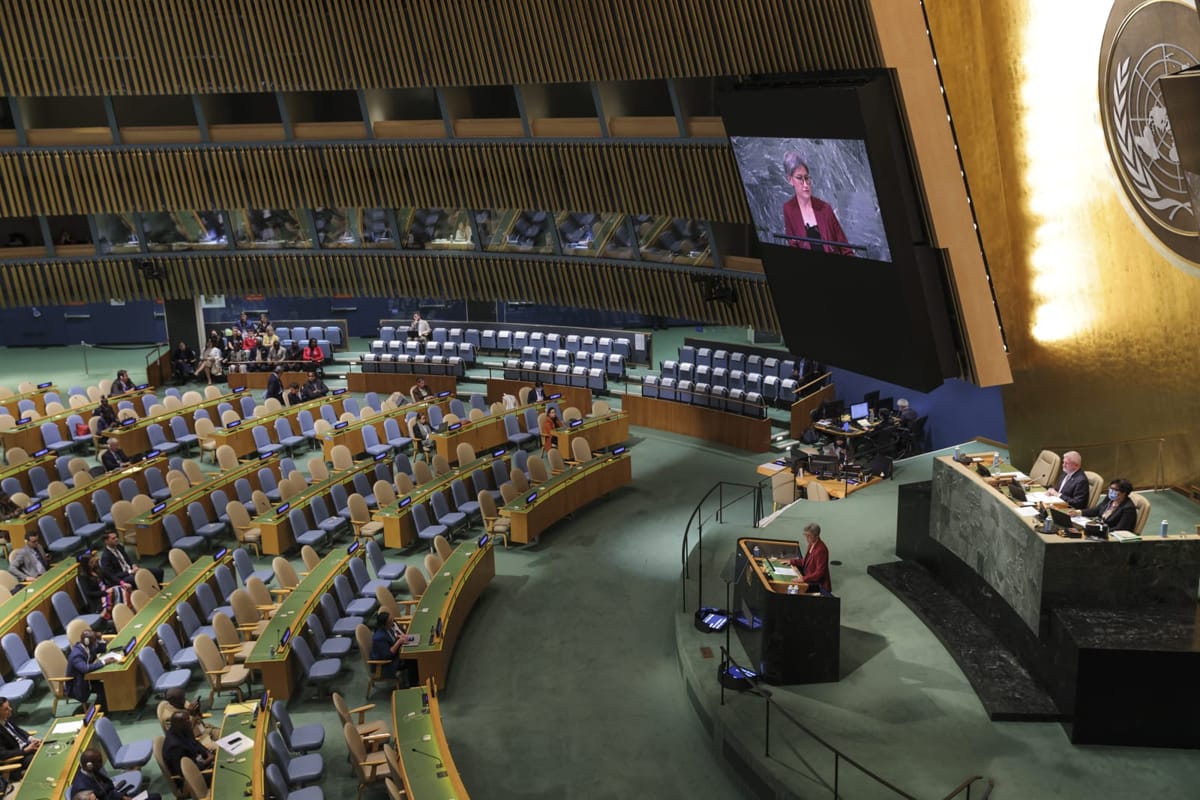Australia was once an international trailblazer. Throughout the Hawke-Keating years, Australia brokered the Paris Peace agreements, co-founded APEC, and drove negotiations on the Comprehensive Nuclear-Test-Ban Treaty and the Chemical Weapons Convention. Now, it seems Australia’s overarching foreign policy objective is merely “managing” great power competition.
The first year of the Albanese Labor government has certainly seen a more energetic and constructive approach to Australian foreign policy. Foreign Minister Penny Wong has presented to the world an image of a modern, multicultural Australia that is both in and of the Indo-Pacific. China relations have risen from a historical nadir thanks to a more nuanced approach pithily summarised by the formula “cooperate where we can” and “disagree where we must”.
But the conduct of Australian foreign policy shouldn’t be allowed to obscure its actual content. If the central objective of the nascent Wong Doctrine remains achieving “strategic equilibrium” in our region, this reflects a fundamentally conservative approach to international relations, whereby issues of international justice, equity, and fairness are subordinated to the pursuit of great power balancing.
While the Albanese government has wholeheartedly defended the so-called international “rules-based system”, it remains deafeningly silent on its underlying injustices, many of which are legacies of colonial exploitation that continue to perpetuate inequalities between developed and developing countries. Australia has done little to support the African Union’s bid for a seat at the G20, especially in its early stages. In response to recent climate disasters such as the Pakistan floods, Australia has provided an inconsequential amount of humanitarian assistance. Australia has no vision for reforming the international financial architecture to fund climate adaptation and mitigation. And the Australian government has responded to existential development and security challenges with an incrementalist budget that undermines Wong’s rhetoric of enhanced partnership and inclusion.
Australia’s major progressive party has become resigned to the international system as it is, abandoning attempts to remake international law and global governance in favour of a geopoliticised approach better suited to 19th century Europe. Australia now champions more flexible, “minilateral” initiatives such as the Quad, which seeks “to respond to the region’s most pressing challenges”, as adjudicated by only four countries.
But this approach profoundly misunderstands how great power politics has emerged endogenously from the “liberal international order.” The exclusionary nature of existing international law and institutions, which are perceived by many developing countries to be partial and unrepresentative instruments of Western power, has fuelled rising discontent. This resentment is key to the appeal of China’s proposed alternatives.

Yet there is no shortage of options for reforming the international order to overcome the zero-sum logic of great power competition that has ensnared Australian foreign policy.
To tackle the biased structure of international institutions, Australia could vigorously and publicly campaign for the proportionate representation of Asia, Africa, Latin America, and the Pacific across the United Nations, the World Bank, and the International Monetary Fund (IMF). While Australia has been willing to provide subdued support for UN Security Council reform, it should expand and amplify this campaign to include new targets, such as the embarrassingly archaic practice of American leadership of the World Bank and European leadership of the IMF.
To address abiding imperial legacies, Australia should support India in its campaign for Britain to return stolen artefacts such as the Koh-i-noor diamond. Stolen artefact repatriation is an issue of tremendous importance to many First Nations Australians, and state premiers are beginning to signal action in the absence of a strong federal response.
And to take meaningful action on climate change, which disproportionately threatens the Pacific, Australia should lobby for the large-scale redistribution of IMF-issued Special Drawing Rights (SDRs) from high-income countries to climate adaptation and mitigation funds targeted at low-income countries. Australia could lead the charge by immediately lending the vast majority of its dormant SDRs, valued at nearly $20 billion, to the IMF’s Resilience and Sustainability Trust, with little effect on the government’s balance sheet.
Any of these measures would significantly increase the perceived legitimacy of the international order and signal Australia’s willingness to defend the interests of the region, even when they conflict with those of its Western allies. As a Western-aligned country situated in the Indo-Pacific, Australia could be particularly effective at prosecuting a progressive, reformist agenda. Yet the present incrementalist, consensus-driven approach fuels the perception that Australia defends the region’s interests only when convenient.
Perhaps AUKUS, signed by the Coalition government, has stifled a more ambitious Australian foreign policy. If Australia, for example, sought to pressure Britain into returning stolen artefacts, Britain could reserve the right to brandish the AUKUS agreement and threaten delays or cancellation, jeopardising the future of Australian defence policy. That is the nature of great power politics, after all, which Labor appears too comfortable in accepting.

